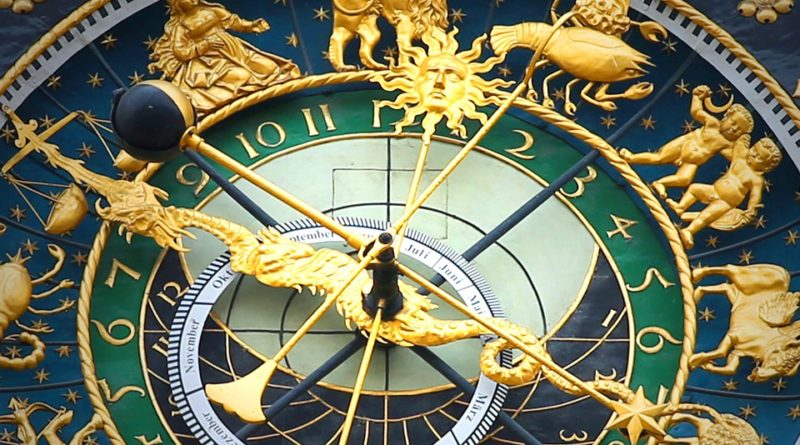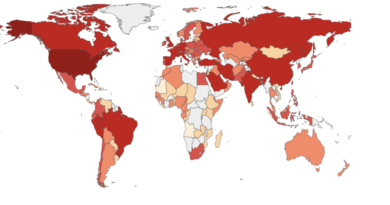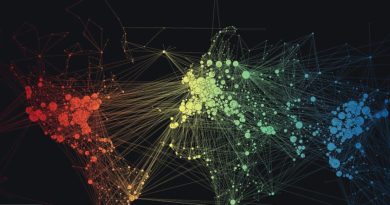Is Astrology Science?
Literally, astrology is a system about the proposition that celestial bodies and astronomical phenomena have effects on human character and destiny. so is astrology a science? what is the history of astrology? why do we believe in horoscopes? here you are.
Astro means, star. logie means, discourse, or information. ın ancient times, many civilizations benefited from astrology and astronomy. Hindu, china, and Maya developed their own systems to predict terrestrial events using celestial bodies. Egypt became Hellenistic when Alexander the Great conquered Egypt. Babylonian astrology and Egypt’s decanoic astrology were mixed and the foundations of today’s western astrology were laid. horoscopic astrology is widely used today.
Astrology was very popular before the renaissance. most states worked with astrologers. because it was important to be able to predict a power that will collapse in advance, important natural phenomena, or famine. firstly Nicolaus Copernicus ‘ solar-centric thought later Galileo‘s eccentric theories contradicted the bible, even accusing him of reinterpreting the Bible. they ordered galileo to give up on the idea that the earth revolves around the sun and not write about it. galileo conceded this order for a while but was later sentenced to house arrest on the ground that he wrote the world-centric thought of aristo and defended Kopernik’s thoughts. by combining mathematics and experiment, galileo laid the foundations of the first scientific methodology. after Galileo and Kepler, astrology and astronomy separated from each other forever, and astrology gradually lost its importance.
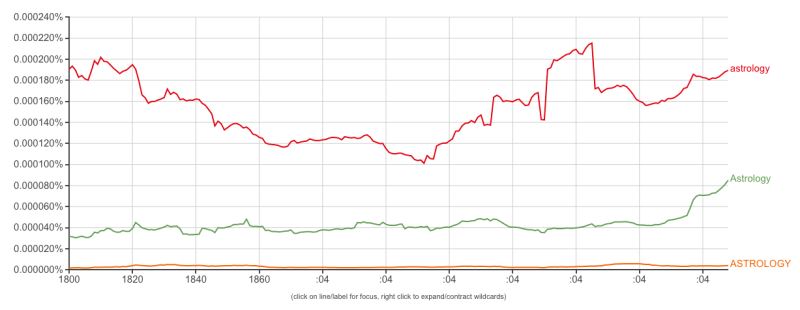
As seen in the graphic, the popularity of astrology between 1800 and 2008 as seen in the graphic, astrology has been declining since t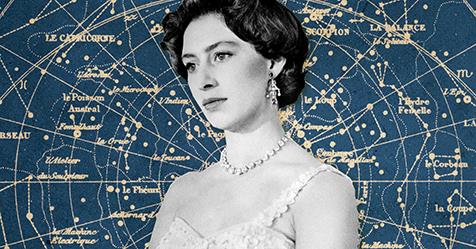 he 1800s. ıt is on the rise with the first world war, in which America is not very effective. War-related estimates cause it. There was a clear rise in 1930. the reason for this is an event that makes astrology still popular today. a London gaze had reserved a corner for an astrologer named Naylor to make a prediction about the birth of Princess Margaret, born in 1930. Naylor had predicted that when Margaret was seven years old, incredibly important events would occur for the royal family. and he was right… just before she turned 7, her uncle left the throne to his father. so her older sister Elizabeth became the heir to the throne. following this mysterious guess, the newspaper gave a corner to the astrologer Naylor. he also wrote horoscopes for ordinary readers according to the sun signs to appeal to the wider audience. this idea was also adopted by other newspapers. we are still reading astrology predictions in newspapers because of an astrologer’s correct prediction.
he 1800s. ıt is on the rise with the first world war, in which America is not very effective. War-related estimates cause it. There was a clear rise in 1930. the reason for this is an event that makes astrology still popular today. a London gaze had reserved a corner for an astrologer named Naylor to make a prediction about the birth of Princess Margaret, born in 1930. Naylor had predicted that when Margaret was seven years old, incredibly important events would occur for the royal family. and he was right… just before she turned 7, her uncle left the throne to his father. so her older sister Elizabeth became the heir to the throne. following this mysterious guess, the newspaper gave a corner to the astrologer Naylor. he also wrote horoscopes for ordinary readers according to the sun signs to appeal to the wider audience. this idea was also adopted by other newspapers. we are still reading astrology predictions in newspapers because of an astrologer’s correct prediction.
The chart is going down a bit in the period of the second world war and after. then it increases again. after the Vietnam war, it is experiencing a dramatic decline and cannot reach its former popularity.
So is astrology science? astrology is the search for meaning in the sky in general. astrology claims that the sequence of constellations and planets at the time of your birth is influential on the human character and destiny. so what is science? this is a set of studies that involves the systemic examination of the structure and movements of the physical and natural universe through experiments and observations. what is essential in science is the experiment. hypotheses are tried, if the results are consistent, this claim gains scientific validity. the zero hypothesis for astrology is that astrologers’ predictions will not be better than random predictions. and of course, science has tried astrology.
The double-blind study designed by Shawn Carlson tested the predictions of 28 astrologers from Europe and America with a high reputation. the study matched the birth maps of over 100 participants with the psychological profiles prepared by California psychological inventory. the test was defined fairly by the astrological authorities.
the test results were published in a highly reputable magazine, nature. the study revealed that astrologers couldn’t match birth charts better than chance by corresponding personality tests. moreover, astrologers have not been able to make accurate predictions even when they have high self-confidence.
There is another experiment called the Barnum effect. ın the experiment conducted at the university, the teacher distributes a text to the students and in the text, “you need other people to appreciate and appreciate you, you have a tendency to criticize yourself, you have an unused capacity that you can turn into a great advantage, you have personality weaknesses that you can compensate, from time to time, and that you are doing the right thing. your serious doubt occurs, sometimes extroverted, tolerant, while at other times social introverted and cautious” such as round there are sentences. and he asks the students to rate it out of 5 on how much they describe this experiment. it turns out to be 4.30 on average. he says that after the test he gave all students a draft taken from an astrology book. although everyone read and evaluated the same article, they thought that it was a good fit for them. This is what astrology and fortune-tellers do. they list the problems and character traits that may be in everyone with round sentences. after a certain period of time, the people they have influenced will begin to believe whatever they say without question.
According to NASA, the horoscope dates set 3000 years ago are not valid at the moment. Horoscope dates have changed as the sky changed during this time. For example, someone born on the 4th of August is not a lion sign, but a crab sign.
Then why do we believe in astrology? people tend to believe in spiritual and extraordinary powers. when you look at the gods in mythologies, most are related to a natural phenomenon. Helios is the sun god, Aiolos is a wind god, Artemis is the moon goddess, Poseidon is the earthquake goddess. as with many superstitions, many of the stories behind western astrology is based on greek mythology. man has tried to add meaning to the forces that he could not explain logically for centuries, and this trend still continues. somehow, superstitions have survived to the present day. these fantastic phenomena attract our attention both in the cinema and the stories told. ın a study on who believes more in astrology, they found that those who had a personal crisis in their lives were more interested in astrology. their interest in astrology also increased as the uncertainty around them increased. people who feel less control of their lives tend to believe in astrology. astrology and personal crisis. ıf you haven’t met your white horse prince, you need someone to tell him about his future, believe him, glorify him, and put it in the center of your life. Just as religions promised us paradise.
We can look at the skinner box experiment to understand why we believe in astrology and myths like it. When the pigeon in the skinner box gets a reward while it is spinning, the pigeon thinks it is because it has returned, but the reward comes automatically at certain time intervals.
Russian film director Tarkovsky asks in Nostalgia, “why only women pray?” as is known, women are more interested in astrology and beliefs like him. it is thought to have several reasons. the first is education. women are less educated than men, but although this gap diminishes over time, there has been no change in belief inequality. although education is one of the reasons, it does not seem to be a decisive reason. one of the reasons why women are more traditionalistic may be that women are more vulnerable in nature. traditions and rules protect the weak. so women are more attached to these rules. for hormonal reasons, women are more likely to accept the power of authority because they are more obedient and docile. Men are more rebellious due to testosterone, does not bow to authority, and tends to be a materialist. masculine women were found less religious than feminine women. people read the character traits of their horoscopes and identify these traits which are not specific with the effect of Barnum and which are more or less common in everyone. they even start to imitate horoscope features. gender and religion study
Carl Sagan said:
“ı was born in a closed room out of reach of the lights of mars. would mars only affect me with gravitation, but wouldn’t the gravitational force of birth control be greater than that of mars? mars were too big, but the obstetrician was much closer…”
ıf you want to know a person, look at what he is doing, ask which books he is reading, what branches of art he is interested in, his world view, his hobbies, his ideas. not the zodiac sign… Astrology is a primitive classification that has not been saved from the shadow of the mysticism of the dark ages. it is nothing but the satisfaction of belonging to a group.
